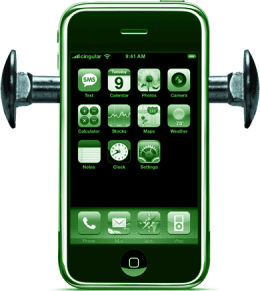Apple readying emerging market 'iCloud-powered' iPhone?

Apple has been working on a slimmed-down iPhone for the emerging markets -- aimed particularly at the low-income consumer, a market it has yet to crack.

FrankeniPhone?
While so many of us presumed that the 'iPhone nano' could present itself as a physically smaller device, it is being reported that the emerging market iPhone could be made up from spare handsets from previous models, with some of the innards ripped out.
Dubbed by many the 'iCloud iPhone', Apple wants to hit the emerging market to swamp the world's most populated country -- China -- with its products; something it has yet to truly conquer.
By stripping out flash storage in the iPhone 4, Apple can reduce 15 per cent of the cost across millions of units, creating a substantial saving by using the iCloud as one of the primary sources for storage.
According to reports, Apple is aiming for a $400 cost of building -- around $200 less than the unsubsidized cost of the iPhone 4 model -- which would then be further subsidized by mobile network operators.
Ultimately this could lead to effectively a free handset for low-income consumers, with a cloud-based storage model.
Though the iPhone 5 may be coming out next month, as further rumours suggest, this could be the perfect opportunity for Apple to hit the emerging markets, such as China and Asia, with a low cost smartphone.
But some question whether the 'iCloud-powered' iPhone could even work. Flash storage is a necessity for any smartphone, and the iPhone is no exception. Seeing as the iCloud syncs to each connected device, the iPhone would still need to have some flash storage -- rather than streaming content continuously from the iCloud.
Having said that, if Apple were to replace it with a permanently installed flash memory card, for which you can buy a 2GB mini-SD card for less than $20 on Amazon, this would solve the problem.
And that doesn't even take into account the data consumption. If carriers are to subsidise the iPhone, and then take one hell of a beating from -- let's say from the emerging Chinese market -- with a potential of half a billion people using these slimmed down iPhones, the networks would cripple almost immediately.
Then again: I'm a geek, not a nerd. I wouldn't even know where to begin with the logistics of this storage and networking nightmare. There are those far better qualified than me to dissect this one.
But naturally, to cover one's behind, it is only a rumor, and has yet to be verified. Looks like we have only a month to wait until we find out, anyhow.
Related content: